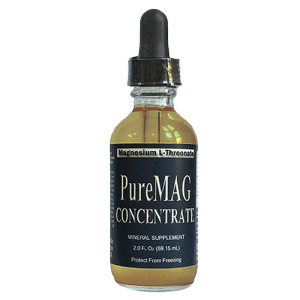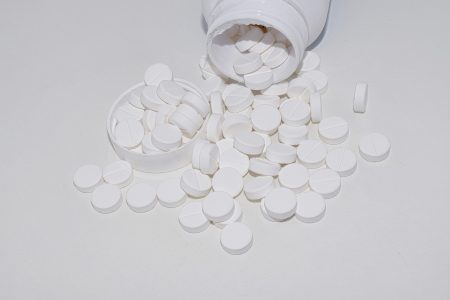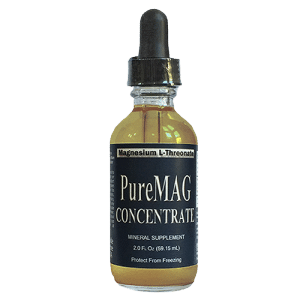Pure MAG Concentrate
ShopFreeMart PureMag Concentrate™ is a new chelated form of magnesium that was developed by a team of neuroscientists at Massachusetts Institute of Technology and Tsinghua University in Beijing who bound magnesium to l-threonate, a vitamin C metabolite.
Magnesium the Master Mineral
 Magnesium has been called the Master Mineral because it is essential to life, found in every living cell and is required for every physiological process that goes on in our bodies. It is as necessary to life as oxygen and water. When you run out of magnesium, your heart goes into spasm (heart attack) and you die. Within the last fifty years, research indicates that approximately eight million people have died from heart failure, due to a lack of magnesium alone.
Magnesium has been called the Master Mineral because it is essential to life, found in every living cell and is required for every physiological process that goes on in our bodies. It is as necessary to life as oxygen and water. When you run out of magnesium, your heart goes into spasm (heart attack) and you die. Within the last fifty years, research indicates that approximately eight million people have died from heart failure, due to a lack of magnesium alone.
Magnesium helps form bones, protein and fatty acids. Essential for energy production, insulin secretion and heart function.
Magnesium works in partnership with calcium and boron in many physiological functions including nervous and cardiovascular processes and bone-building.
Magnesium plays a vital role in the contraction and relaxation of muscles, including skeletal muscles, as well as those of the gastrointestinal tract, and muscles regulating blood flow, blood pressure and breathing passages.
Mental and emotional functions require adequate magnesium for neurotransmitter and hormone production. Magnesium is also essential for making new cells, activating B vitamins, clotting blood and secretion of insulin.
Magnesium is essential for the production and utilization of ATP (our energy currency) and perhaps the two biggest symptoms of Magnesium deficiency are fatigue and weakness.
Magnesium Deficiency Symptoms
- Arrhythmia
- Bone weakness
- Diabetes
- Edema
- Fatigue
- Fibromyalgia
- Hypertension / High blood pressure
- Irritability
- Joint and muscle inflammation, pain and stiffness
- Muscle weakness, cramps and twitches
- Osteoporosis
- PMS
- Poor circulation
- Sleep Disorders
Three categories of deficiency symptoms
- Early symptoms include irritability, anorexia, fatigue, insomnia, and muscle twitching. Other symptoms include poor memory, apathy, confusion, and reduced ability to learn.
- Moderate deficiency symptoms consist of rapid heartbeat and other cardiovascular changes.
- Severe deficiency symptoms could lead to tingling, numbness, and a sustained contraction of the muscles.
Magnesium is particularly important for a healthy brain and nervous system. It exhibits anti-stress, anti-anxiety, anti-depressive and neuroprotective properties. However, since magnesium supplements do not readily cross into the brain, there has always been a quandary with the therapeutic use of magnesium for cognitive and mental health issues.
There is a new breakthrough form of magnesium that solves this problem.
What is Magnesium L-Threonate?

It is a chelated form of magnesium that was developed by a team of neuroscientists at Massachusetts Institute of Technology and Tsinghua University in Beijing who bound magnesium to l-threonate, a vitamin C metabolite. (1)
Chelated simply means that the magnesium molecules are bonded to another molecule. Chelation can improve a magnesium supplement’s stability, absorption, and bioavailability. (2)
Magnesium sulphate is a form of magnesium that naturally occurs in Epsom salts, but the body can absorb very little of this form of magnesium without hydrochloric acid being taken in conjunction with it. And since it can’t be readily absorbed, the body must get rid of it and thus it acts as a harsh laxative in the bowel. Magnesium sulphate is one of the worst forms of magnesium that you can take, especially if improving brain function is your goal. (3)
Frustratingly, very little of the magnesium found in typical supplements gets into the brain, limiting its therapeutic value. (4)
How Does Magnesium L-Threonate Work?
Magnesium is largely missing from the modern diet due to current farming practices. More than half of the industrialized world is magnesium-deficient. In the US, it is estimated that only 32% of the population get the RDA (recommended daily allowance) of magnesium.
The need for magnesium in the brain is high. It is found in higher concentrations in the brain than in the blood. It plays a critical role in a number of brain-related and neurological conditions including depression, anxiety, ADHD, bipolar disorder, schizophrenia, addictions, acute brain injury, seizures, Parkinson’s disease, and Alzheimer’s disease. (6, 7, 8, 9, 10, 11)
Magnesium l-threonate was specifically created to cross the brain’s protective filter, the blood-brain barrier. (12)
Another brain enhancing property of magnesium l-threonate is that it increases brain plasticity. (13)
Plasticity is the brain’s ability to change and grow, and is fundamental for memory and learning to take place.
Lastly, there’s evidence that magnesium l-threonate can increase brain-derived neurotropic factor (BDNF), a protein that stimulates the formation of new brain cells.
What the Research Shows
There are dozens of known magnesium benefits.
Appropriate magnesium supplementation has been proven to lift mood, increase resilience to stress, improve focus and concentration, raise energy levels, and improve sleep quality. (14)
It’s also good for a wide variety of conditions not related to brain health such as asthma, muscle cramps, high blood pressure, osteoporosis, and heart disease.
Of the dozen or so studies done on magnesium l-threonate, there’s been only one clinical trial (i.e., study on humans).
Clinical Trial Results
There is only one clinical trial published in a peer-reviewed medical journal. Study participants were older adults (ages 50 through 70) who reported concerns with memory, concentration, anxiety, and sleep. (15)
They were evaluated for four aspects of cognitive ability — working memory, episodic memory, attention, and executive function (the set of skills that helps you set goals, plan, and get things done).
Participants in the study were given magnesium l-threonate for 12 weeks. The same as the results in animal studies, magnesium l-threonate increased magnesium levels in human brain cells as well.
When retested for cognitive ability, all participants performed significantly better in all four cognitive areas. Another interesting factor is that magnesium l-threonate also significantly reduced their biological brain age.
On average, participant’s brains functioned as if they were 9.4 years younger than when the study began, according to standard tests. This is very encouraging news!
However, magnesium l-threonate did not help with sleep, mood, or anxiety any better than a placebo.
Animal Studies
Magnesium l-threonate works by increasing the calming neurotransmitter GABA, while reducing the release of stress hormones. (16)
It also works at the blood-brain barrier to prevent stress chemicals from entering the brain. (17)
The results of animal research suggest that magnesium l-threonate could be particularly helpful for anxiety disorders, such as phobias and post-traumatic stress disorder, but human studies are needed. (18)
Magnesium l-threonate shows potential for treating dementia and Alzheimer’s disease.
There’s a well-established link between low magnesium and all kinds of dementia, including Alzheimer’s. (19)
Research studying human populations finds that diets high in magnesium correlate to lowered risk of all kinds of dementia. (20)
Mice and rats are commonly used in Alzheimer’s research because they have good memories and develop similar brain diseases as humans.
Magnesium l-threonate provides substantial neuroprotective benefits and prevents memory loss and mental decline in aging rats. Researchers are hoping to see the same potential for treating Alzheimer’s in humans. (21, 22, 23)
Magnesium l-threonate aids learning and three kinds of memory.
Rats became smarter, better “students” when given magnesium l-threonate. (24)
They learned more readily and showed improvements in working, short-term, and long-term memory. (25, 26)
Magnesium L-Threonate: The Bottom Line
Magnesium is a mineral required for good physical and mental health.
But the therapeutic use of magnesium supplementation for cognitive health problems has been stymied by this mineral’s inability to pass through the brain’s protective filter.
Magnesium l-threonate was synthesized specifically to overcome this problem.
It readily crosses into the brain where it increases brain plasticity and encourages the formation of new brain cells.
It shows promise for treating memory loss, brain aging, anxiety, dementia, Alzheimer’s, and more.
Since most people are low in magnesium and it’s a safe essential mineral, there is no reason not to try magnesium l-threonate to boost your cognitive abilities.
The color of our mineral solutions can and do change with time and here is why.
We do not add any chemicals or color at all to any of our products.
White light hits the particles of Magnesium in suspension, but not all of the wave lengths are absorbed; the ones that are not absorbed are reflected back as the color one sees. What is absorbed or reflected back is determined by the size and the concentration of the Magnesium particles.
Other manufacturers add stabilizing chemicals to their mineral solutions to prevent them from conglomerating together, thus causing a different color. We do not add stabilizing chemicals in order to maintain purity.
The tendency for Magnesium particles to conglomerate increases as the concentration increases. ShopFreeMart PureMag “Magnesium L Threonate” is at 50,000 PPM, which is slightly above saturation point, which will cause a small amount of Magnesium to show up on the bottom of the bottle.
ShopFreeMart PureMag “Magnesium L Threonate” will not be clear like most liquid Magnesium products due to the extreme concentration of this product. Regardless of the color, the Magnesium particles are 100% safe because they are 98+% pure to begin with and are suspended in pure pharmaceutical grade water.
The products that one should be suspicious of are the ones that are too stable and one should ask what chemical has been added to provide this stability. The fact that we do not have a chemical stabilizer in our mineral solutions is evidenced by the fact that it can, and does, change color over time. Nevertheless, it remains 100% safe and effective.
Claims
No claims are made for this product. The foregoing information was gathered from several websites, including Pub Med sites from various countries, that are believed to be reliable and which are readily available to the reader. It is presented for educational purposes only and not as medical advice. ShopFreeMart PureMag Concentrate™ is not a medicine and is not meant to prevent or treat any disease. Any possible benefits to be derived from using this product are strictly nutritional.
which are readily available to the reader. It is presented for educational purposes only and not as medical advice. ShopFreeMart PureMag Concentrate™ is not a medicine and is not meant to prevent or treat any disease. Any possible benefits to be derived from using this product are strictly nutritional.
Suggested Usage for Maintenance
Adults take 40 drops under the tongue or mix with a small amount of Free-Mart Water (mixed) to be gargled or swished in the mouth for approximately six minutes before swallowing.
Children 4+ years use 10 drops in the same manner.
Younger children 1-2 drops in the mouth.
ShopFreeMart PureMag may also be applied topically and through absorption directly into the skin may go more directly to muscles and tissues that are experiencing pain, cramping or discomfort due to lack of Magnesium.
Note: Tapping the Magnesium container 9x on the palm of the hand each time before using may increase viability. This is known as percussion in homeopathy.
Ingredients: Free-Mart PureMag Concentrate is our trademarked brand consisting of 98+% pure Magnesium L Threonate dispersed and suspended in pure, pharmaceutical grade water.
Join the free membership buying club today
ShopFreeMart
Get your PureMag Concentrate product Now!
Click: Freemart2OrganicHealth
- https://medicalxpress.com/news/2010-01-magnesium-supplement-boost-brainpower.html
- http://peoplesrx.com/the-best-kind-of-magnesium-for-you
- http://www.druginformer.com/search/side_effect_details/magnesium%20sulfate/amnesia.html
- https://www.ncbi.nlm.nih.gov/pubmed/27829572
- https://www.webmd.com/brain/news/20100127/magnesium-may-improve-memory
- https://examine.com/supplements/Magnesium
- http://umm.edu/health/medical/altmed/supplement/magnesium
- https://www.ncbi.nlm.nih.gov/pmc/articles/PMC2738337
- http://europepmc.org/abstract/med/9368236
- http://www.psychiatrictimes.com/bipolar-disorder/integrative-treatment-bipolar-disorder-review-evidence-and-recommendations/page/0/2
- https://www.ncbi.nlm.nih.gov/pubmed/27829572
- https://medicalxpress.com/news/2010-01-magnesium-supplement-boost-brainpower.html
- https://www.ncbi.nlm.nih.gov/pubmed/22016520
- https://examine.com/supplements/Magnesium/
- https://www.ncbi.nlm.nih.gov/pmc/articles/PMC4927823/
- https://www.ncbi.nlm.nih.gov/pubmed/11447329
- http://evolutionarypsychiatry.blogspot.com/2010/10/magnesium-and-brain.html
- https://www.ncbi.nlm.nih.gov/pubmed/22016520
- https://www.ncbi.nlm.nih.gov/pubmed/21951617
- https://www.ncbi.nlm.nih.gov/pubmed/22860881
- https://www.ncbi.nlm.nih.gov/pubmed/27178134
- https://www.ncbi.nlm.nih.gov/pubmed/25213836
- https://www.ncbi.nlm.nih.gov/pmc/articles/PMC4172865/
- https://www.ncbi.nlm.nih.gov/pubmed/27178134
- https://www.ncbi.nlm.nih.gov/pubmed/20152124
- https://www.ncbi.nlm.nih.gov/pubmed/24077207
- https://ods.od.nih.gov/factsheets/Magnesium-HealthProfessional/